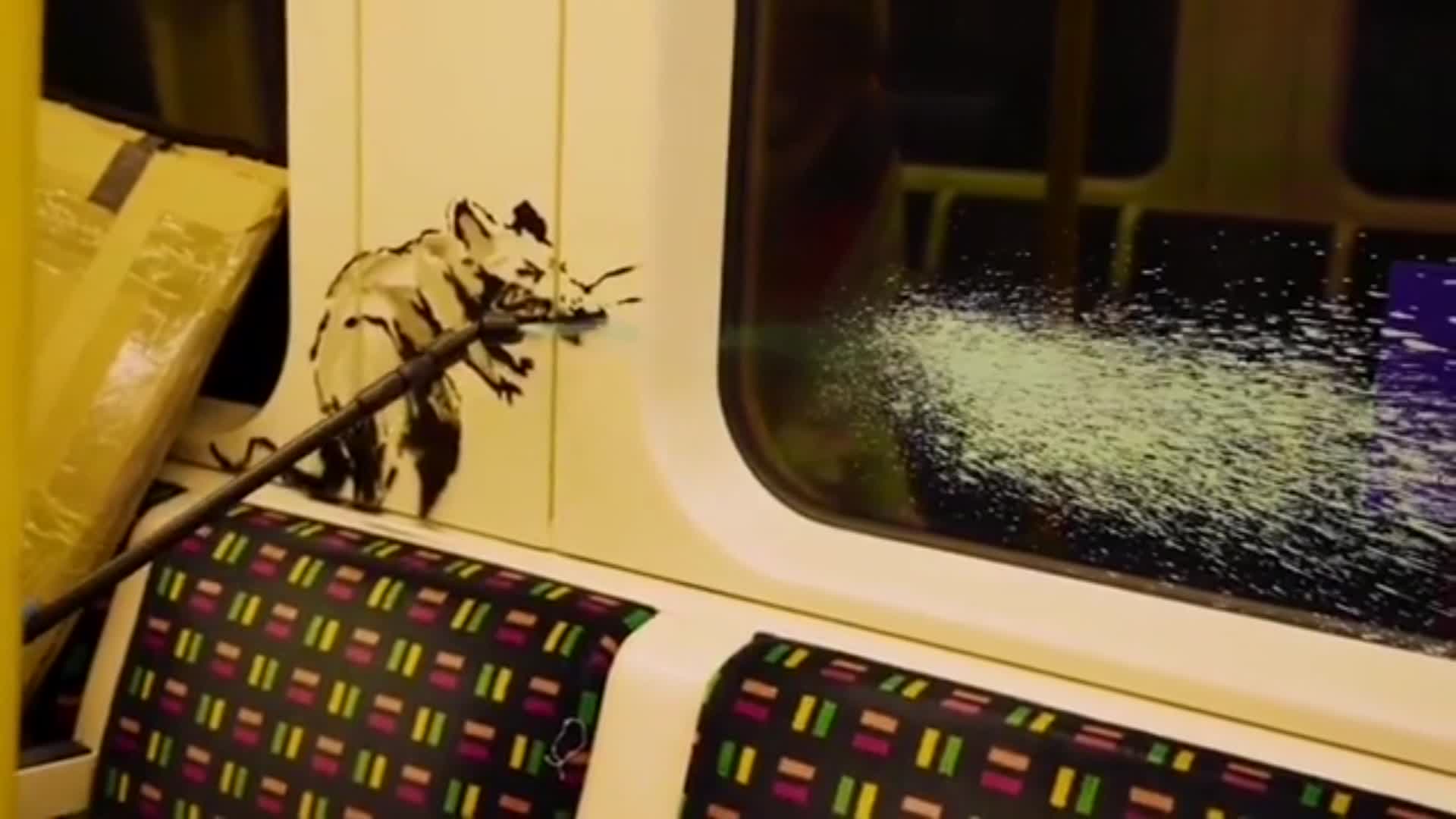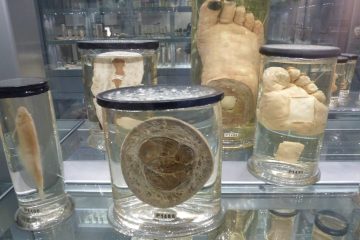

Chumbawamba? They’re the I get knocked down ones, right? Wrong. Prompted by Banksy’s recent stunt on the tube, I took a look at the one-hit-wonders, and was surprised to find a politically engaged band who spent three decades trying to get their message across. It’s the last time I’ll judge a band on one song alone.
On Tuesday 14 July, street artist and political activist Banksy posted a video on Instagram captioned: ‘If you don’t mask — you don’t get.’ The clip shows Banksy spray painting his infamous rats on a Circle Line train.
The train pulls into a station, the wall reads: ‘I get lockdown.’ The tube doors close, the next line revealed: ‘But I get up again.’
One rat sneezes a mucoid blue cloud across a window. Others use face masks to parachute down inside the carriage. Banksy tags his name in this same face-mask blue — and his message couldn’t be clearer if he’d scribbled it across my forehead: wear one.
My overall feelings about Banksy aside (I tend to find his work too on-the-nose) the video’s parting shot won me over. The train pulls into a station, the wall reads: ‘I get lockdown.’ The tube doors close, the next line revealed: ‘But I get up again.’

Thanks to Chumbawamba and Banksy’s synthesis, Sammi Gale will never judge a band on one song alone
While Banksy’s work was quickly removed due to TFL’s strict graffiti policy, Chumbawamba’s 1997 hit song ‘Tubthumping’ stayed with me. I get knocked down, but I get up again. You’re never gonna keep me down, I sang in my head, tittering.
Somewhat guiltily admitting to a mate of mine how easily amused I am by wordplay involving 90s novelty songs, my friend explained that Chumbawamba were actually an anarcho-punk band who campaigned in the name of libertarian socialist issues. Surely not, I thought, humming I get lockdown silently to myself.
A tub thumper, I have since found out, is a vociferous political campaigner…
Then I dug a bit deeper. For a start, I’d always assumed ‘Tubthumping’ was just a word, as irreverent and devoid of meaning as ‘Chumbawamba’. A tub thumper, I have since found out, is a vociferous political campaigner. Ever since its use in the 1650s, in reference to non-conformist priests banging on their pulpits, the word has been bound up with counterculture and the public sphere.
Guitarist Bogg Whalley told The Guardian in 2016 that ‘Tubthumping’ was ‘about the resilience of ordinary people’. In broad terms, yes. Yet, based on this description, you’ve probably got a picture in your mind not dissimilar to the song’s recent rendition by Breeze (a Leeds City Council initiative for 0–19-year-olds), in which young people from across the city sing ‘Leeds gets locked down’ in a heart-warming, Zoom-like montage.
https://www.instagram.com/p/CCn800cFIbe/?utm_source=ig_web_copy_link
Based on Chumbawamba’s punk roots and staunch political activism, however, ‘resilience’ might be taken as referring to class struggle and ‘ordinary people’ to refer more specifically to working class people.
From the early eighties to the mid-nineties, the band squatted in an abandoned house in Leeds. Where, in their early work, you can hear a clear debt to legendary punk collective Crass, Chumbawamba diverge in their injection of humour and satire — though their political commentary is no less cutting.
Their first album Pictures of Starving Children Sell Records (1986) kicks off with a scathing critique of (then recently televised) Live Aid and the hypocrisy of the artists and flows of capital involved (‘the cycle of hungry children / will keep going ‘round / […] / ’Till we burn the House of Commons to the ground’). The album goes on to take swipes at colonialism, the patriarchy, and above all the need to overthrow the capitalist system.
As Chumbawamba moved away from the pacifist ideology of the peace punk scene, they were considered sell-outs. They often played picket lines and protests, aligning themselves with the working class in a sometimes violent struggle against Thatcher’s Union busting.

This political activism continued on into the 90s (the band took part in the 1990 Poll Tax riots) and they moved further away from punk, inspired by the illegal warehouse parties and dance beats that were changing the fabric of youth culture and incorporating these sounds, which slotted in easily with their DIY mentality.
The lyrics ‘Pour me another double-cliché / You can’t write a song that’s never been sung’ appear on the band’s fifth studio album Shhh, which had to be almost entirely rewritten because it (intentionally) breached copyright infringement. The original version went beyond the cut-and-paste samples of hip hop, and would have amounted to chewing up the mainstream and spitting it out in grisly pieces.
How ironic, then, that from these unwavering anti-capitalist origins, Chumbawamba achieved such mainstream success. Their label One Little Indian didn’t want to put out Tubthumper, so the band accepted £100,000 from EMI Germany (having previously appeared on a 1989 record titled FUCK EMI.)
Put in the context of a musical career that spanned three decades, ‘Tubthumping’ has become for me a very different song. Swept up by the football chant chorus, I had never noticed, for instance, that the song samples Danny’s (Pete Postalwhaite’s) speech in Brassed Off, a film which follows the plight of a brass band in a coal mining community following the closure of their pit.
The evening ended with the drummer pouring an icy bucket of water over John Prescott. How had all this escaped me?
I hadn’t considered that the next song following this on the album would be ‘Amnesia’, which explores the dishonesty of politicians, the ignorance of voters, and ends with a sample of a public service announcement on Mad Cow Disease.
When Chumbawamba performed ‘Tubthumping’ at the 1998 Brit Awards, they did so clad in jumpsuits reading ‘SELL OUT’, ‘SHIFT UNITS’, and ‘LABEL WHORE’ against footage of British protest movements. They replaced the lyrics before the chorus to: ‘New Labour sold out the dockers / Just like they sold out the rest of us’. The evening ended with the drummer pouring an icy bucket of water over John Prescott. How had all this escaped me?
The story of Chumbawamba is representative of an age-old dilemma: sell out and get your message out to a larger audience, or remain principled, yet most probably obscure. Chumbawamba decided to put their Agit-Prop message on the world stage, to shake up the system from within. Bizarre case in point: when the band got $100,000 for their song ‘Pass it Along’ to be used in a General Motors advert, the money was then immediately distributed to groups like Indymedia and Corpwatch to be used in anti-corporate campaigns — talk about, biting the hand that feeds you.
The Chumbawamba strategy is, of course, one that has been adopted by Banksy. When he painted his recent lockdown message on the tube, I’m sure he knew more about the political undercurrent beneath the lyrics than I did. Perhaps, it was a wry allusion to his own adoption by the market he still doggedly criticises.
…this latest tube graffiti is a reminder that much of Banksy’s work is not necessarily made to be sold.
Now, Banksy is hardly in need of money, and arguably it’s from a place of luxury that the artist can look on bemused at an auction house that has sold several of his works for six figures each and write on his website ‘I Can’t Believe You Morons Actually Buy This Shit.’
But then, this latest tube graffiti is a reminder that much of his work is not necessarily made to be sold; I’ll bet he was banking on the cleaning staff scrubbing it off post-haste. The question is, do cheesy, crowd-pleasing choruses or Instagram-pandering video stunts dilute the credibility of messages of dissent and nonconformity, or do the ends justify the means?
Get off the pub dance floor, and you see how ‘I get knocked down’ has a material reality: now when I hear that line, I picture kettling, rubber bullets, and riot shields. Maybe if I got off Instagram (and managed to repress the knowledge that Banksy’s estimated net worth upwards of £20 million) I could see the artist’s spray paint as another form of material push-back — something that got waylaid by the market on its way to the picket line.


